英语语法一般将来时归纳总结
- 格式:doc
- 大小:69.00 KB
- 文档页数:9
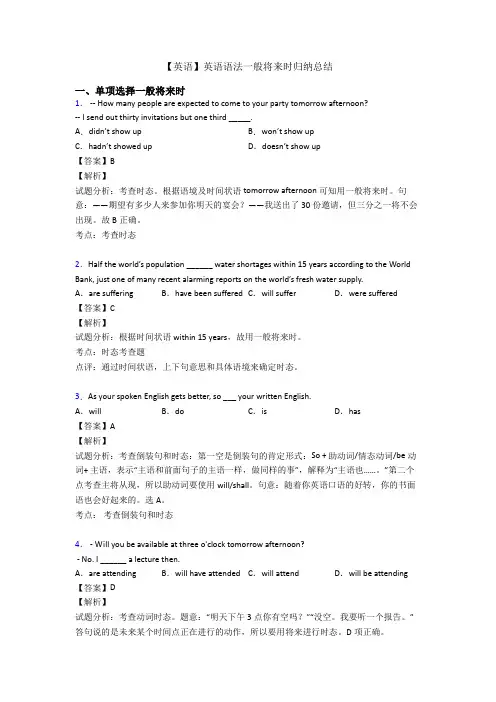
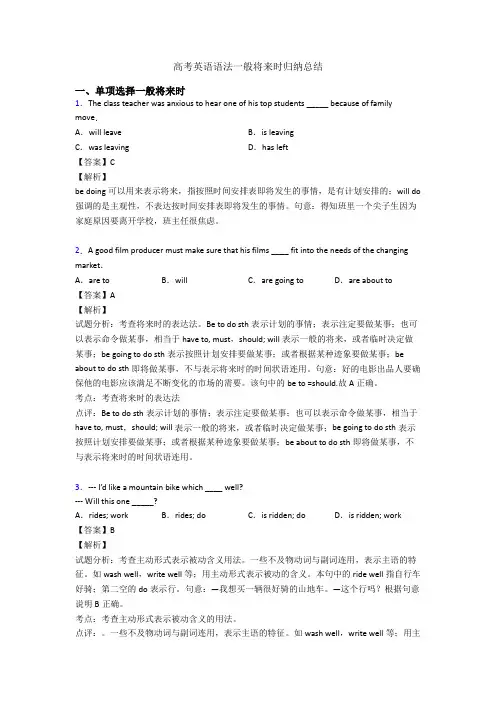
高考英语语法一般将来时归纳总结一、单项选择一般将来时1.The class teacher was anxious to hear one of his top students _____ because of family move.A.will leave B.is leavingC.was leaving D.has left【答案】C【解析】be doing可以用来表示将来,指按照时间安排表即将发生的事情,是有计划安排的;will do 强调的是主观性,不表达按时间安排表即将发生的事情。
句意:得知班里一个尖子生因为家庭原因要离开学校,班主任很焦虑。
2.A good film producer must make sure that his films ____ fit into the needs of the changing market.A.are to B.will C.are going to D.are about to【答案】A【解析】试题分析:考查将来时的表达法。
Be to do sth表示计划的事情;表示注定要做某事;也可以表示命令做某事,相当于have to, must,should; will表示一般的将来,或者临时决定做某事;be going to do sth表示按照计划安排要做某事;或者根据某种迹象要做某事;be about to do sth即将做某事,不与表示将来时的时间状语连用。
句意:好的电影出品人要确保他的电影应该满足不断变化的市场的需要。
该句中的be to =should.故A正确。
考点:考查将来时的表达法点评:Be to do sth表示计划的事情;表示注定要做某事;也可以表示命令做某事,相当于have to, must,should; will表示一般的将来,或者临时决定做某事;be going to do sth表示按照计划安排要做某事;或者根据某种迹象要做某事;be about to do sth即将做某事,不与表示将来时的时间状语连用。
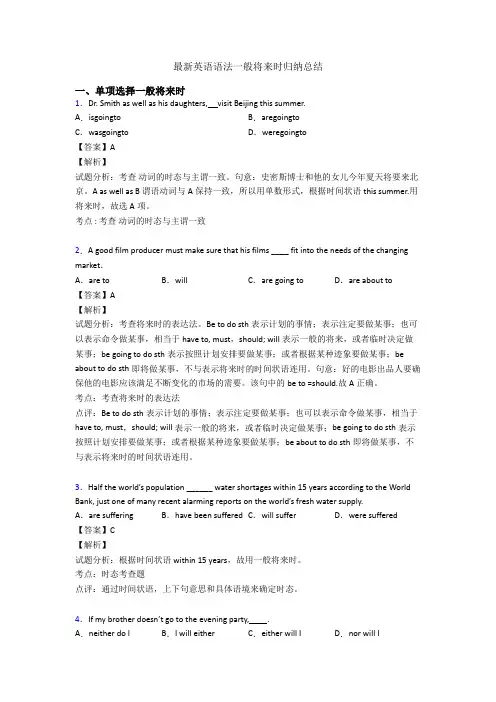
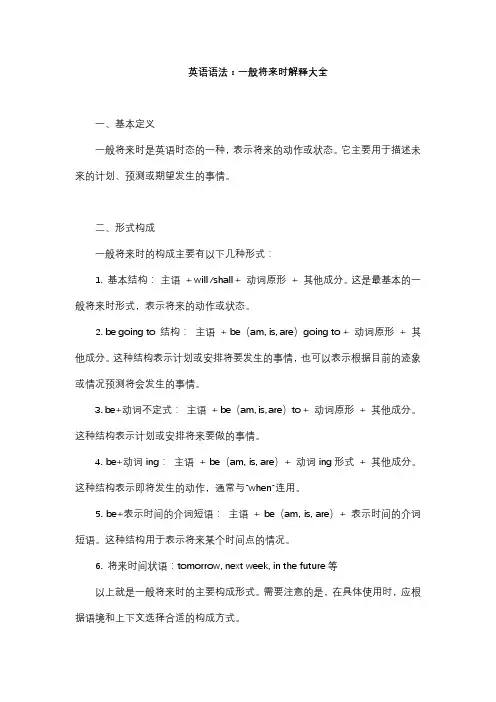
英语语法:一般将来时解释大全一、基本定义一般将来时是英语时态的一种,表示将来的动作或状态。
它主要用于描述未来的计划、预测或期望发生的事情。
二、形式构成一般将来时的构成主要有以下几种形式:1. 基本结构:主语+ will /shall + 动词原形+ 其他成分。
这是最基本的一般将来时形式,表示将来的动作或状态。
2. be going to 结构:主语+ be(am, is, are)going to + 动词原形+ 其他成分。
这种结构表示计划或安排将要发生的事情,也可以表示根据目前的迹象或情况预测将会发生的事情。
3. be+动词不定式:主语+ be(am, is, are)to + 动词原形+ 其他成分。
这种结构表示计划或安排将来要做的事情。
4. be+动词ing:主语+ be(am, is, are)+ 动词ing形式+ 其他成分。
这种结构表示即将发生的动作,通常与“when”连用。
5. be+表示时间的介词短语:主语+ be(am, is, are)+ 表示时间的介词短语。
这种结构用于表示将来某个时间点的情况。
6. 将来时间状语:tomorrow, next week, in the future等以上就是一般将来时的主要构成形式。
需要注意的是,在具体使用时,应根据语境和上下文选择合适的构成方式。
三、用法场景1. 表达未来的计划或意图,例如:I will go to the beach next summer.2. 描述未来的预测或期望,例如:It will rain this afternoon.3. 在条件句中表示将来的结果,例如:If you study hard, you will pass the exam.四、与其他时态的区别1. 与现在进行时态的区别:现在进行时态强调正在进行的动作,而一般将来时态强调将来的动作或状态。
2. 与过去时态的区别:过去时态表示过去的动作或状态,与将来时间无关。
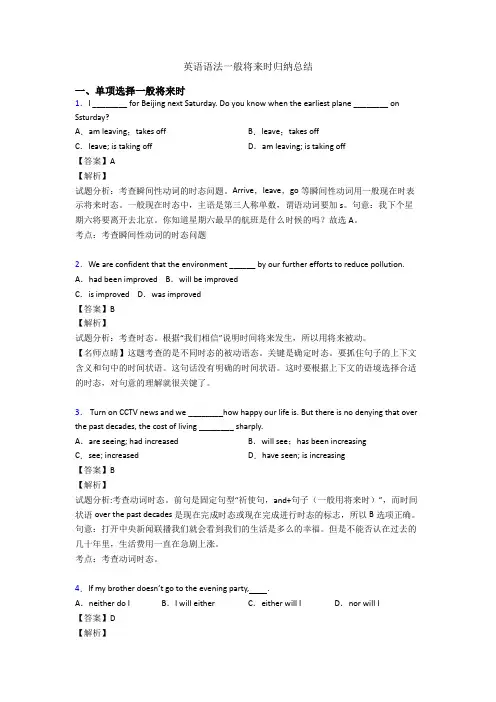
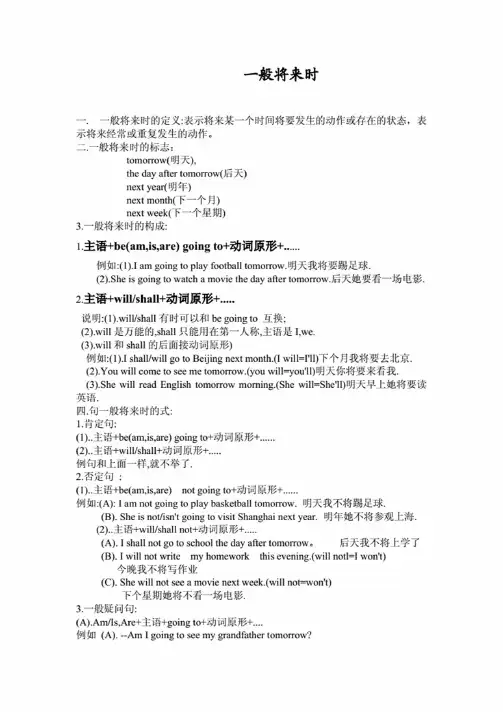
一般将来时一.一般将来时的定义:表示将来某一个时间将要发生的动作或存在的状态,表示将来经常或重复发生的动作。
二.一般将来时的标志:tomorrow(明天),the day after tomorrow(后天)next year(明年)next month(T—个月)next week(下一个星期)3.一般将来时的构成:1.主语^be(am,is,are)going to+动词原形+..例如:(1).I am going to play football tomorrow.明天我将要踢足球.(2).She is going to watch a movie the day after tomorrow.后天她要看一场电影.2.主语+will/shall+动词原形+.....说明:(l).will/shall有时可以和be going to互换;(2) .will是万能的,shall只能用在第一人称,主语是I,we.(3) .will和shall的后而接动词原形)例如shall/will go to Beijing next month.。
will=I11)下个月我将要去北京.(2) .You will come to see me tomorrow.(you will=you'll)明天你将要来看我.(3) .She will read English tomorrow moming.(She will=She'll)明天早上她将要读英语.四.句一般将来时的式:1.肯定句:(1) ..主语+be(am,is,are)going to+动词原形+......(2) ..主语+will/shall+动词原形+.....例句和上面一样,就不举了.2.否定句:(1)..主语+be(am,is,are)not going to+动词原形+......例如:(A):I am not going to play basketball tomorrow.明天我不将踢足球.(B).She is not/isn't going to visit Shanghai next year.明年她不将参观上海.(2)..主语+will/shall not+动词原形+.....(A).I shall not go to school the day after tomorrow o后天我不将上学了(B).I will not write my homework this evening.(will notl=I won't)今晚我不将写作业(C).She will not see a movie next week.(will not=won't)下个星期她将不看一场电影.3.一般疑问句:(A).Am/Is,Are+主语+going to+动词原形+....例如(A).—Am I going to see my grandfather tomorrow?明天我将去看我的爷爷吗?—Yes,you are.是的,你将去.(B).— Are you going to listening to the tape tomorrow?明天你将听录音带吗?—No,I am not.不,我不将.(C). —Is she going to Beijing next year? 明年我将去北京吗?-Yes,she is.是的,她将.(2).Will//shall+主语+动词原形+…例如(A). —Shall we play volleyball next class?下一节课我们将打排球吗?-Yes,you will,是的,你们将.(B). —Will you come here next week?下个星期你将来这儿吗?-Yes,I will.是的,我将.(C).--Will she teach us this term?这学期,她将教我们吗?—Yes,she will.是的,她将.4.特殊疑问句:(1).What(Where,How...)+be(am,is,are)+主语+going to+动词原形+...?例如:(A).—What are you going to do tomorrow? 明天你将要做什么?—rm going to the park? 我将要去动物园.(B).--Where are you going to swim? 你将要去哪儿游泳?—I'm going to swim in the river.(2). What(When,Where,How...)+主语+动词原形+...?例如:(A).---What will you do next week?下个星期你将要做什么?--1 will do my homeworko 我将要做作业.(B).—How will she come here tomorrow?明天她将要怎么来这儿?—She will come here by bus 。
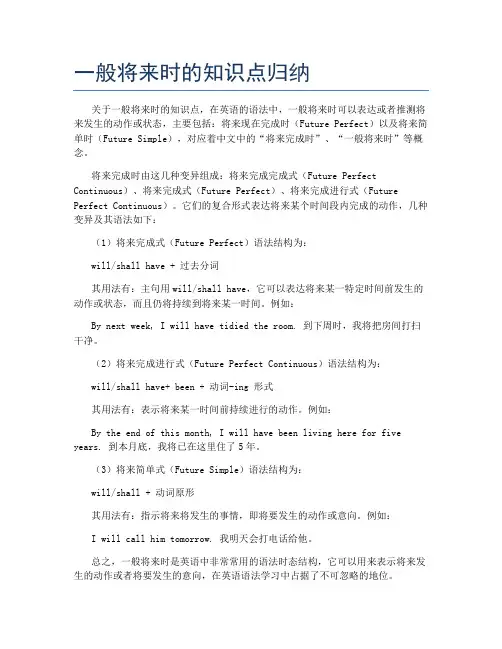
一般将来时的知识点归纳关于一般将来时的知识点,在英语的语法中,一般将来时可以表达或者推测将来发生的动作或状态,主要包括:将来现在完成时(Future Perfect)以及将来简单时(Future Simple),对应着中文中的“将来完成时”、“一般将来时”等概念。
将来完成时由这几种变异组成:将来完成完成式(Future Perfect Continuous)、将来完成式(Future Perfect)、将来完成进行式(Future Perfect Continuous)。
它们的复合形式表达将来某个时间段内完成的动作,几种变异及其语法如下:(1)将来完成式(Future Perfect)语法结构为:will/shall have + 过去分词其用法有:主句用will/shall have,它可以表达将来某一特定时间前发生的动作或状态,而且仍将持续到将来某一时间。
例如:By next week, I will have tidied the room. 到下周时,我将把房间打扫干净。
(2)将来完成进行式(Future Perfect Continuous)语法结构为:will/shall have+ been + 动词-ing 形式其用法有:表示将来某一时间前持续进行的动作。
例如:By the end of this month, I will have been living here for five years. 到本月底,我将已在这里住了5年。
(3)将来简单式(Future Simple)语法结构为:will/shall + 动词原形其用法有:指示将来将发生的事情,即将要发生的动作或意向。
例如:I will call him tomorrow. 我明天会打电话给他。
总之,一般将来时是英语中非常常用的语法时态结构,它可以用来表示将来发生的动作或者将要发生的意向,在英语语法学习中占据了不可忽略的地位。
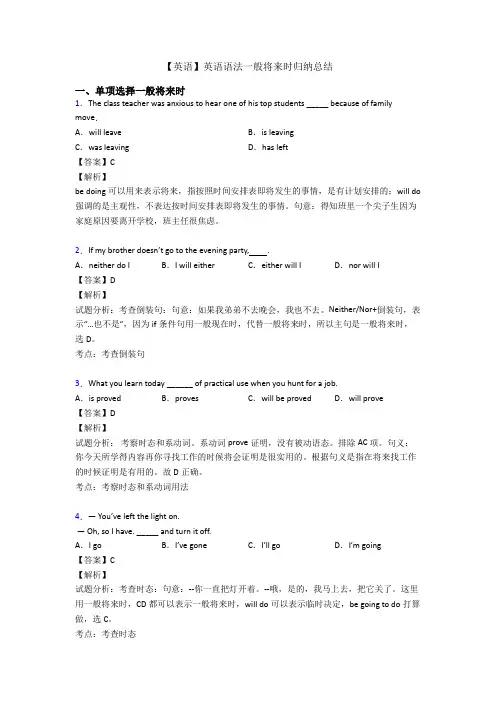
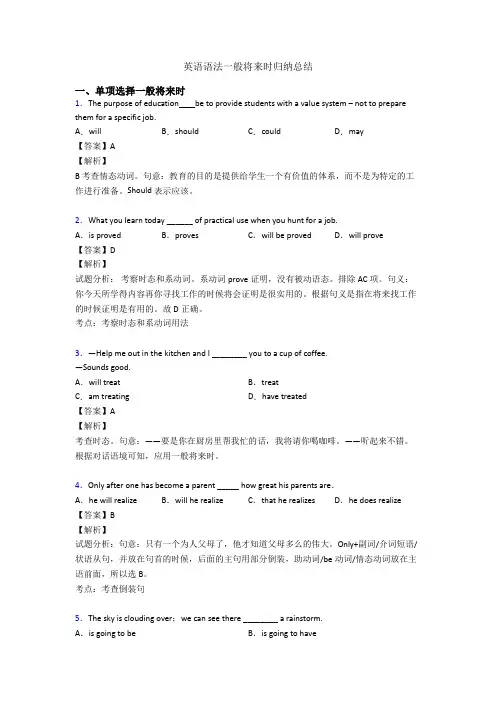
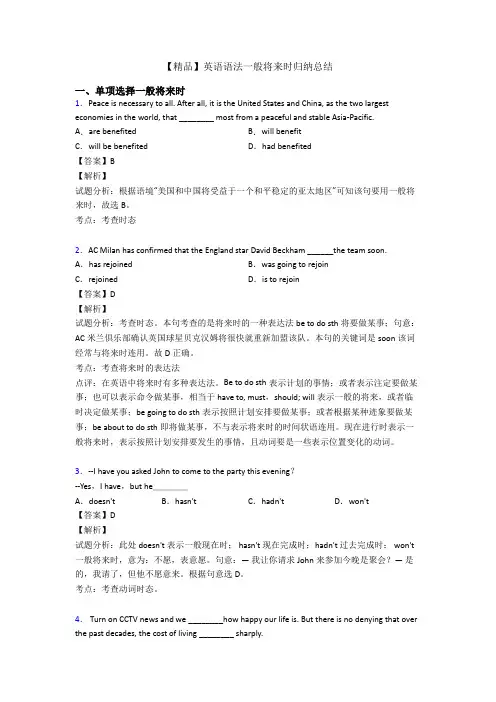
【精品】英语语法一般将来时归纳总结一、单项选择一般将来时1.Peace is necessary to all. After all, it is the United States and China, as the two largest economies in the world, that ________ most from a peaceful and stable Asia-Pacific.A.are benefited B.will benefitC.will be benefited D.had benefited【答案】B【解析】试题分析:根据语境“美国和中国将受益于一个和平稳定的亚太地区”可知该句要用一般将来时,故选B。
考点:考查时态2.AC Milan has confirmed that the England star David Beckham ______the team soon. A.has rejoined B.was going to rejoinC.rejoined D.is to rejoin【答案】D【解析】试题分析:考查时态。
本句考查的是将来时的一种表达法be to do sth将要做某事;句意:AC米兰俱乐部确认英国球星贝克汉姆将很快就重新加盟该队。
本句的关键词是soon该词经常与将来时连用。
故D正确。
考点:考查将来时的表达法点评:在英语中将来时有多种表达法。
Be to do sth表示计划的事情;或者表示注定要做某事;也可以表示命令做某事,相当于have to, must,should; will表示一般的将来,或者临时决定做某事;be going to do sth表示按照计划安排要做某事;或者根据某种迹象要做某事;be about to do sth即将做某事,不与表示将来时的时间状语连用。
现在进行时表示一般将来时,表示按照计划安排要发生的事情,且动词要是一些表示位置变化的动词。
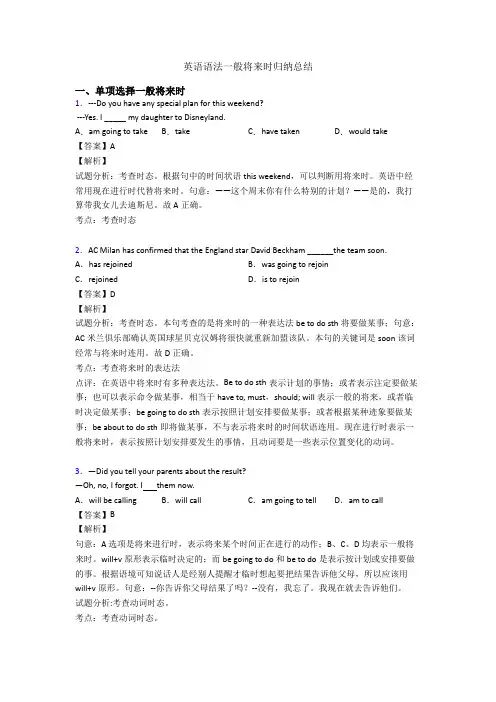
英语语法一般将来时归纳总结一、单项选择一般将来时1.---Do you have any special plan for this weekend?---Yes. I _____ my daughter to Disneyland.A.am going to take B.take C.have taken D.would take【答案】A【解析】试题分析:考查时态。
根据句中的时间状语this weekend,可以判断用将来时。
英语中经常用现在进行时代替将来时。
句意:——这个周末你有什么特别的计划?——是的,我打算带我女儿去迪斯尼。
故A正确。
考点:考查时态2.AC Milan has confirmed that the England star David Beckham ______the team soon. A.has rejoined B.was going to rejoinC.rejoined D.is to rejoin【答案】D【解析】试题分析:考查时态。
本句考查的是将来时的一种表达法be to do sth将要做某事;句意:AC米兰俱乐部确认英国球星贝克汉姆将很快就重新加盟该队。
本句的关键词是soon该词经常与将来时连用。
故D正确。
考点:考查将来时的表达法点评:在英语中将来时有多种表达法。
Be to do sth表示计划的事情;或者表示注定要做某事;也可以表示命令做某事,相当于have to, must,should; will表示一般的将来,或者临时决定做某事;be going to do sth表示按照计划安排要做某事;或者根据某种迹象要做某事;be about to do sth即将做某事,不与表示将来时的时间状语连用。
现在进行时表示一般将来时,表示按照计划安排要发生的事情,且动词要是一些表示位置变化的动词。
3.—Did you tell your parents about the result?—Oh, no, I forgot. I them now.A.will be calling B.will call C.am going to tell D.am to call【答案】B【解析】句意:A 选项是将来进行时,表示将来某个时间正在进行的动作;B、C、D均表示一般将来时。
初中英语语法汇总(一般将来时)初中英语语法汇总〔一般将来时〕一、一般将来时的定义一般将来时表示在如今看来即将要发生的动作或存在的状态。
常用时间副词tomorrow, soon或短语next year / week / month, in a few days, in the future, sometime 做状语。
二、一般将来时的基本用法及构成〔1〕一般将来时的基本用法是表示单纯的将来事实,由"will / shall + 动词原形'构成:〔shall只用于第一人称〕例句:We shall have a lot of rain next month. 下个月将下许多雨。
I think she will pass the exam. 我想他考试会及格的。
〔2〕"be going to+动词原形'用来表示事先考虑过的将要发生的动作以及已有迹象说明必将要发生的某事,意为"准备;就要'。
如:1. Were going to meet outside the school gate. 我们准备在校门口见面。
2. Look! Its going to rain. 瞧!快下雨了。
(3) 用"be to+动词原形'表示。
主要表示按打算或支配即将要发生的动作;有时也表示指令、禁止或可能性:He is to leave for Beijing tomorrow. 他确定明天去北京。
Tell him hes not to be back late. 告知他不准迟回。
(4) 用"be about to+动词原形'表示。
主要表示即将要发生的事:He is about to leave. 他即将要离开。
Sit down, everyone. The film is about to start. 大家坐好,电影马上就要开发始了。
注:该结构通常不与具体的时间状语连用:误:He is about to leave soon [tomorrow].另外,该结构在美国英语中还可表示"准备'(主要用于否认句):Im not about to lend him any more money. 我不准备再借给他任何钱。
一般将来时一、概念:表示将要发生的动作或存在的状态及打算、计划或准备做某事。
句中一般有以下时间状语:tomorrow, next day(week, month, year…),soon, the day after tomorrow(后天)等。
二、基本结构:①be going to + do;②will+ do.三、否定句:在be动词(am, is, are)l后加not或情态动词will后加not成won’t。
例如:I’m going to have a picnic this afternoon.→ I’m not going to have a picnic this afternoon.四、一般疑问句:be或will提到句首,some改为any, and改为or,第一二人称互换。
例如:We are going to go on an outing this weekend. → Are you going to go on an outing this weekend?五、对划线部分提问:一般情况,一般将来时的对划线部分有三种情况。
1. 问人。
Who 例如:I’m going to New York soon. →Who’s going to New York soon.2. 问干什么。
What … do.例如:My father is going to watch a race with me this afternoon. →What is your father going to do with you this afternoon.3. 问什么时候。
When.例如:She’s going to go to bed at nine. →When is she goi ng to bed? 六、同义句:be going to = willI am going to go swimming tomorrow(明天). = I will go swimming tomorrow.一般将来时由助动词shall/will加动词原形构成。
一般将来时语法总结归纳一般将来时是英语语法中常用的时态之一,表示将来某个时间发生的动作或存在的状态。
本文将总结一般将来时的使用规则和相关的注意事项。
一、一般将来时的构成一般将来时由“will / shall + 动词原形”构成,其中“will”适用于所有人称,而“shall”仅适用于第一人称(I 和 we)。
例如:1. I will go shopping tomorrow.(我明天要去购物。
)2. He shall arrive at 5 p.m.(他将于下午5点到达。
)二、一般将来时的用法1. 表示自愿、决心或承诺一般将来时经常用于表示自愿、决心或承诺的动作。
例如:1. I will help you with your homework.(我愿意帮助你做作业。
)2. He will never smoke again.(他决心再也不抽烟了。
)2. 表示预测、推测或预计一般将来时可用于表达预测、推测或预计的动作或状态。
例如:1. It will rain tomorrow.(明天会下雨。
)2. They will probably win the game.(他们很可能会赢得比赛。
)3. 表示习惯或反复发生的动作一般将来时可以用来表示根据过去的行为或事件推断将来会发生的动作。
例如:1. He will often call his parents.(他通常会给父母打电话。
)2. They will always eat dinner at home.(他们总是在家吃晚餐。
)4. 表示请求、邀请或建议一般将来时也可用于表示请求、邀请或建议的动作。
例如:1. Will you please close the window?(请你关上窗户好吗?)2. Shall we meet at the café?(我们要在咖啡馆见面吗?)三、注意事项1. 否定形式将"will not"缩写为"won't",放在动词之前。